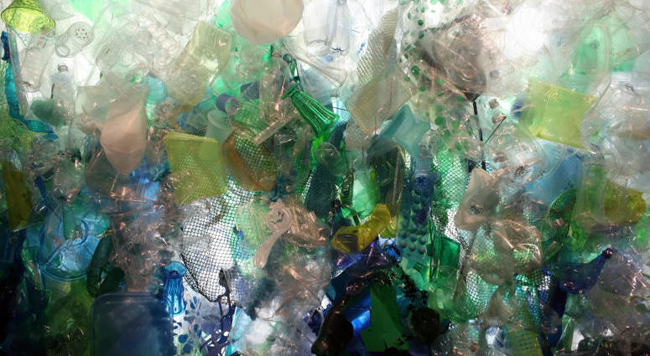
The pervasiveness of plastic debris impacts our waters as well as life on land. Credit: Dreamstime.com.
Filed By: Tom Puckett, WBEN 930 AM Radio
Lawmakers plan on passing plastic bag ban as part of state budget; NYSG
provides insights on potential related marine debris issues
Contact:
Helen Domske, NYSG Coastal Education Specialist, P: 716-645-3610, E: hmd4@cornell.edu
Buffalo, NY, March 29, 2019 - As state lawmakers are expected to pass a plastic bag ban as part of the state budget, we're taking a look at the damage the bags can do to the envrionment.
"Eventually when they break down, they break down into smaller and smaller pieces," says Helen Domske of New York Sea Grant. She notes there is no definitive timeline on when plastic bags will break down. She notes the damage is noticeable when they're not recycled. "Less than three to five percent get recycled, that means most of them get recycled. That means most of them are in landfills. Plastic bags are lightweight, the air picks them, you see them along the roadway and into our waterways."
Interview with Helen Domske, New York Sea Grant
If you don't see the player above, it's because you're using a
non-Flash device (eg, iPhone or iPad). You can download the mp3 file by clicking here (mp3). It may take a few minutes to download, so please be patient.
Domske says she's seen the damage first hand, including a necropsy where a sea turtle had plastic bag pieces inside. "If fish or other aquatic organisms eat this plastic, it can affect their health," notes Domske.
She adds plastic bags are made of polymers but then chemicals are added for color or strength, so as they break down, they can release tosic chemicals into the environment.
Assemblyman Patrick Burke agrees with the ban, but not with banning things one year at a time. "I don't want to keep banning things on people," says Burke. "I'd like it to be holistic, I'd like to explain it to people what the problem is and identify it," saying it's more than just plastic bags, citing bottles and utensils. Burke prefers to have people prepare for what things will be like once a ban takes effect.
Interview with Assemblyman Patrick Burke on plastic bag ban
If you don't see the player above, it's because you're using a
non-Flash device (eg, iPhone or iPad). You can download the mp3 file by clicking here (mp3). It may take a few minutes to download, so please be patient.
Burke says plastic bags were initially pushed because of the the concern over the use of paper bags. He says the best policy is to ban plastic bags and charge for paper bags.
Burke says don't call it a money grab. "I find that fearmongering. It's 10 cents a bag for a legitimate policy. If we're going to charge for paper bags, it's to put it toward an environmental protection fund, so we're investing in solving problems," says Burke.
WBEN is an AM radio station in Buffalo, New York broadcasting a news/talk format. Its 5,000-watt signal covers Buffalo and its suburbs, the Niagara Falls region and Western New York as well as part of southern Ontario, Canada.
More Info: New York Sea Grant
New York Sea Grant (NYSG), a cooperative program of Cornell University
and the State University of New York (SUNY), is one of 33 university-based
programs under the National Oceanic and Atmospheric Administration’s
National Sea Grant College Program.
Since 1971, NYSG has represented a statewide network of integrated
research, education and extension services promoting coastal community
economic vitality, environmental sustainability and citizen awareness
and understanding about the State’s marine and Great Lakes resources.
Through NYSG’s efforts, the combined talents of university scientists
and extension specialists help develop and transfer science-based
information to many coastal user groups—businesses and industries,
federal, state and local government decision-makers and agency managers,
educators, the media and the interested public.
The program maintains Great Lakes offices at Cornell University, SUNY
Buffalo, SUNY Oswego and the Wayne County Cooperative Extension office
in Newark. In the State's marine waters, NYSG has offices at Stony Brook
University in Long Island, Brooklyn College and Cornell Cooperative
Extension in NYC and Kingston in the Hudson Valley.
For updates on Sea Grant activities: www.nyseagrant.org has RSS, Facebook, Twitter, and YouTube links. NYSG offers a free e-list sign up via www.nyseagrant.org/nycoastlines for its flagship publication, NY Coastlines/Currents, which is published quarterly. Our program also produces an occasional e-newsletter,"NOAA Sea Grant's Social Media Review," via its blog, www.nyseagrant.org/blog.